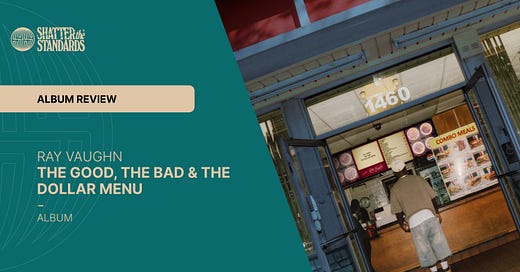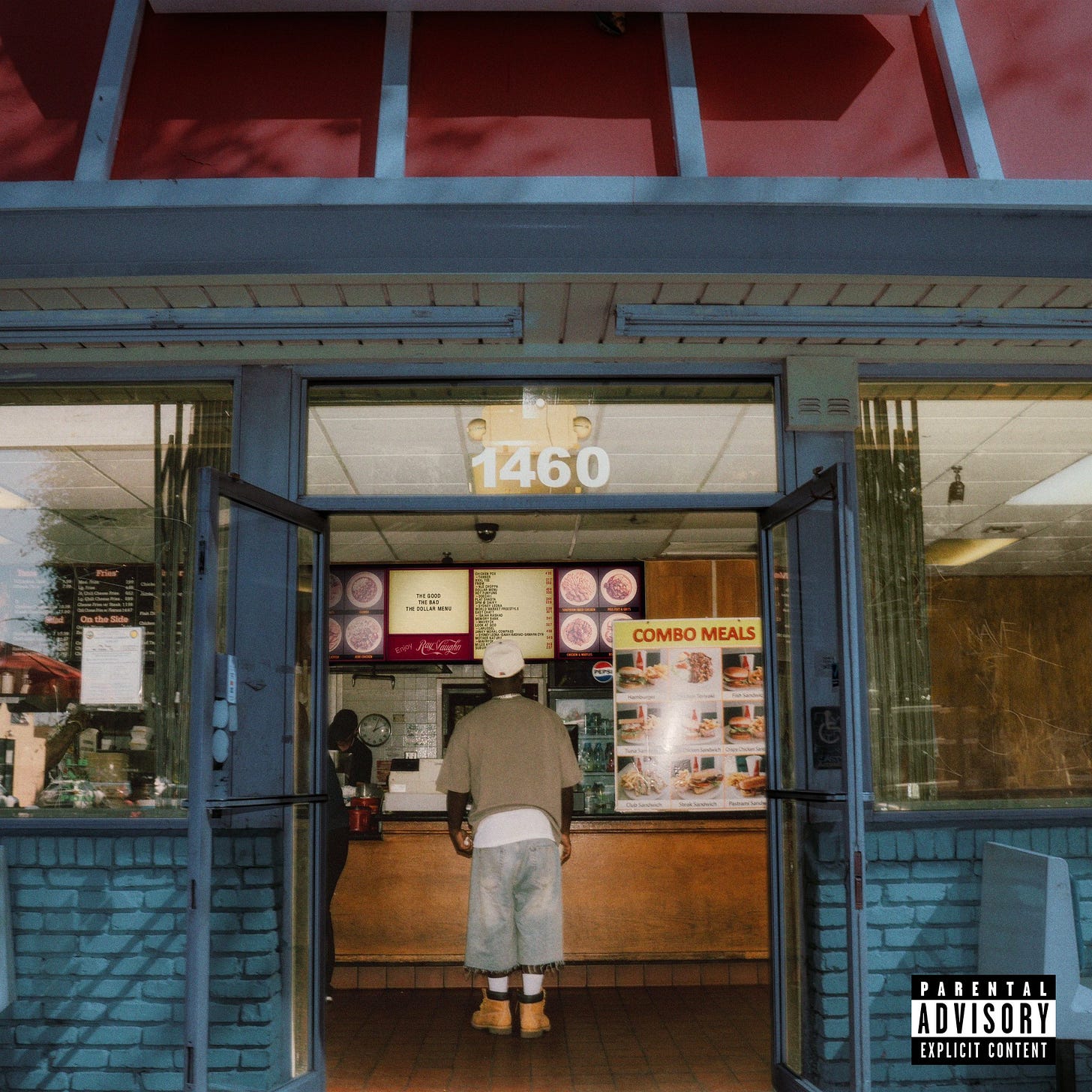Album Review: The Good, The Bad & The Dollar Menu by Ray Vaughn
At its core, The Good, The Bad & The Dollar Menu mediates on scarcity and leveling‑up: stealing Wi‑Fi to upload freestyles, surviving on value meals, then fielding Push verses and festival slots.
Ray Vaughn has spent the last‑year‑and‑a‑half treating The Good, The Bad & The Dollar Menu like a running diary—dropping songs whenever a new chapter finished, testing them on the road, and only now threading the pieces into a full tape. The title comes from two things he repeats in nearly every snippet: the “good” luck of leaving Long Beach with a pen and a deal, the “bad” of the street fallout still haunting his phone, and the McDonald’s dollar‑menu dinners that got him through both. We hear this on “Flocker’s Remorse,” a narrative of financial instability and personal regret through its blunt, conversational bars. In the opening segments, the artist details a life marked by everyday hardships with honesty. Vaughn blends between casual street banter and moments of deep self-reflection, where the weight of responsibility is inevitable.
But how did we get here? Early demos date back to February 2024, right after he and Pusha T cut “Problems.” From there, Vaughn ran what he calls “a no‑rules campaign,” uploading each new cut the moment it cleared. The loose rollout kept fans involved (and let him suss out which records really stuck) but also bought time for clearances; on MTV’s Fresh Out, he joked that the project stayed a mixtape because “samples ain’t cheap, bro.” Regular collaborators Devin Malik and TariqBeats handled much of the day‑to‑day tracking in Carson, while newer names—Kyu Steed and Ricky Surum on “Cemetery Lanterns,” which is not on the project, and Ray himself on a handful of self‑produced interludes—rounded out the sound. Vaughn’s goal, per the original TDE press brief, was to “document every season” of his come‑up, so the sonic palette swings from stark boom‑bap confessionals to 808‑heavy bangers.
With the smooth and laid-back “3PM @ Dairy’s,” it has him wrestling with depression and personal trauma, confronting the consequences of hardship, from losing employment to the heavy weight of family tragedies, using everyday scenarios and candid admissions to capture the bleak emotional state he inhabits (“Who knows a safe place for me to hide?”). It’s the same with one of the tape’s best tracks, “Miles Away from Heaven,” transforming common emotional struggle into a personified, almost intimate acquaintance. This creative personification not only humanizes the concept of depression but also sets the stage for a profoundly personal account of inner turmoil. However, “Flat Shasta” goes really deep on navigating the fragile dynamics of familial ties. Ray Vaughn confronts the painful realities of a parent grappling with mental health issues and substance abuse while also bearing the weight of familial neglect.
He does balance things out with a two-part track, “Dollar Menu.” Vaughn introduces a tone of survival under economic hardship, where even basic sustenance becomes a measure of relief and redemption before the beat shifts toward a blend of bravado and sardonic wit. Bangers include the Isaiah Rashad-assisted “East Chatt,” where both floated over an OutKast sample, “Look @ Good” will have the West Coast bouncing with LaRussell, “Klown Dance” features a hungry Jay Rock, that hopefully we get a fourth album soon, and “Janky Moral Compass” has Vaughn, Sydney Leona (on the hook), and Samara Cyn examining an internal turmoil and the burden of self-awareness with unflinching candor. With the help of a piano-driven production, this approach not only conveys the immediate despair of feeling directionless but also opens a space for contemplating the complex nature of personal recovery and the challenges of self-forgiveness.
At its core, The Good, The Bad & The Dollar Menu is a meditation on scarcity and leveling‑up: stealing Wi‑Fi to upload freestyles, surviving on value meals, then suddenly fielding Push verses and festival slots. The hard-hitting “XXXL Tee,” down to the references to everyday environments and experiences, such as operating “in bixbys” and nodding to influences like CJ from Grand Theft Auto: San Andreas, provides a gritty contextual framework that is unmistakably tied to his lived experience. The good: milestones like buying his mom a condo. The bad: survivor’s guilt and the street baggage unpacked on aforementioned “Cemetery Lanterns.” The dollar menu: a reminder that the two realities can coexist on the same plate. Vaughn’s knack for gallows humor lets those extremes feel less like whiplash and more like episodes of the same sitcom‑turned‑docuseries.
Great (★★★★☆)
Favorite Track(s): “XXXL Tee,” “Flat Shasta,” “Miles Away from Heaven”




